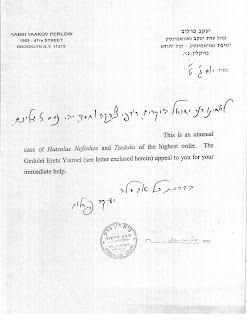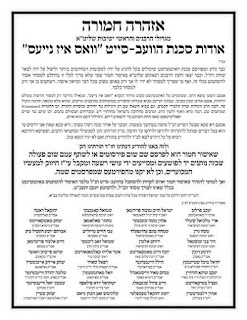by Anonymous Torah WikiLeaker Letz:
CLICK ON MEZUYEF KOL KOREH IMAGES TO ENLARGE:


Nevala Na’asesah B’Yisroel! V’cheyn Lo Yaaseh!
An abomination has been done in Israel!
A tzadik and talmud chochom and ba’al chessed, Rabbi Gershon Kranczer, has been reported to the police for raping his daughters, and has run away to Israel to escape going to jail. First and foremost our hearts are broken for this great man, a close friend of the Gedolei Yisroel, Reb Ahron Shechter and Reb Laizer Ginsberg, Shli’ta. All Jews must stand together in support for this righteous man, who is also the principal of Yeshiva Tehilla L'Dovid for special needs students. Rabbi Kranczer, Shli’ta has done so much good, and so much chesed that he makes even other tzaddikim of our generation like hakodosh Martin Grossman and the Spinka Rebbe pale in comparison. All Jews must come to the aid of this holy individual, who is now being persecuted because he is a Jew.
We strongly and vociferously condemn the actions of the daughters in reporting private behaviors to the authorities:
1. Firstly, it is not tznius to talk about these things, and the girls described disgusting acts in more graphic details than a “Chosson Shmooze” from Rabbi Gissinger in Lakewood, which is an act of nivul peh. Bnos Yisroel should allow themselves to be raped rather than to discuss such not tznius events. Even when we discuss so called “child molestation” we never describe the exact actions that are being done to children. And although the Novominsker Rebbe, Shli’ta said it is now time to sweep the problem out from under you carpet, this is not what he meant - what he meant was its high time you bought a new carpet! We have made it abundantly clear that blogs and the media are not acceptable places to discuss these problems. And besides, Reb Matisyahu Salamon still says that it should be swept under the newest carpet for the purpose of the dignity of the molester. Reb Avraham Chaim Levine said publicly on tape that we NEVER publicize the names of molesters! Certainly the girls did not mean to have the story public, but they should have known that going to the police would make it so, R”L.
2. Secondly, the actions of these girls have placed a needless risk of financial burden on the holy mossad that their father was running. Did they not know that as the administrator, his being forced to leave would hurt the yeshiva? Did they not know that yeshivas are the lifeblood of our community? Have they not heard the Novominkser Rebbe, Shli’ta state publicly that while we “feel bad” for the victims of abuse, the foremost concern of all Yidden must be the mosdos that we, the gedolim own and use to give shtellas to our children and son-in-laws?
3. Furthermore, the actions of the daughters are against Halacha, because many gedolim have ruled that to report allegations of abuse to the police is mesirah. Rabbi Shmuel Kaminetsky, Rabbi Dovid Feinstein, Rabbi Malkiel Kotler and other gedolim have ruled against going to the police. Rabbi Yisroel Belsky, Shlit’a, has stated publicly that such behavior “would not be tolerated” in our community. These girls are to be punished and no school should accept them, the same way as in Lakewood the boy who reported his rape to the police was not allowed in any school. Keep in mind that some of the so-called crimes they accuse their father and brothers of are acts that did not even include penetration, and therefore are not technically abuse according to Moron Harav Chaim Pinchas Sheinberg, Shli’ta.
4. Finally, the worst aveira these girls did was, of course, acting without consulting daas Torah. They arrogantly presumed to know what was better for them to “protect” themselves from the abuse. Only we, the rosh yeshivas, can divine what is best in all situations. Girls, boys, young men and women and parents have no right whatsoever to try to protect themselves from being raped without consulting daas Torah to find out what we have divined. The Novominkser Rebbe, Shli’ta said that parents should warn their children about abusers, but not chas v’chalila to do anything to stop abuse. He said clearly at the Fressers Convention - "The anus (Litvish for onus) is to be placed completely on the child to protect himself or herself, and they should be taught that they must always act al pi daas Torah, like their molesters".
We must reiterate in every language of warning that all allegations of rape, sodomy and child molestation should be reported ONLY to rabbis and a beis din. As Rabbi Shlomo Gottesman said publicly at the recent Agudah convention, the first person to go to is the school principal. He said that today in 2010 there would not be any cover ups. In fact the Yeshiva that Rabbi Kranczer ran, found out months before the police and did not cover it up. They had him resign, and then the girls were surely safe.
What possible good could come out from going to the police?
We must continue to ignore that the principal may BE the molester, such as in the Gerrer Mesivta in Boro Park, where Rabbi Lazerovitz molested dozens of boys, and Satmar Yeshiva in Williamsburg where Rabbi Reichman was the principal for years and was also guilty of molesting many boys. We must ignore the fact that Reb Ahron Feldman, Shli’ta, Rosh Yeshivas Ner Yisroel, is currently continuing to cover up the sex crimes against bochurim of Moshe Eiseman, Shli’ta. Serial molester Rabbi Chaim Abrahamson in Monsey, has been dealt with by Yeshiva of Spring Valley, and Reb Shmuel Kaminetsky has agreed to allow it to be covered up just as all the rest of the cases he knows about. Rabbis Kotler and Salamon, correctly refuse to allow, chas v’shalom the parents of the little boys who allege that Rabbi Eli Gelbwachs physically assaulted their four year olds’ "JUNK" to go to the police, R”L, so that Gelbwachs is still free to work for Hatzala in Lakewood.
Despite the Novominsker’s speech, we must be more vigilant in stopping people from exposing these cover-ups, and making a chillul Hashem. The only way for us to be mekadesh shem Shamayim is for victims of abuse to keep quiet about it, and for anyone who knows about it to refrain from going to the police. In this zechus, may we all merit the Moshiach.
Donations to help the “pidyon shvuim” campaign for Rabbi Kranczer can be mailed to the Novominsker Rebbe (he takes all major credit and debit cards for your convenience) ((except the DiamondCard)) the Munkatcher Rebbe, Shli’ta or directly to attorney Ben Brafman, or attorney Nat Lewin who will I”YH be handling the appeal. The Yated Ne’eman and Hamodia will be reporting about Tehillim Asifas (gatherings) for this great tzadik.
Signing for the Kavod of Daas Torah:
Aharon Shechter, Aryeh Malkiel Kotler, Shmuel Kaminetsky, Yaakov Perlow, Aharon Feldman, Avraham Chaim Levine, Dovid Feinstein, Mattisyahu Salamon, Reuvain Feinstein, Lipa Margulies, Yisroel Belsky, Moshe Eisemann, Avraham Mondrowitz, Yudi Kolko, Chaim Abrahamson, Sholom Tendler, Lipa Brenner, Yisroel Weingarten, Mattis Weinberg, Leib Tropper, Shmuel Zev Juravel, Ben-Zion Sobel, Avraham Lazerovitz, Tzvi Wainhaus, Lipa Templer, Mordechai Tendler, Boruch Mordechai Lebovitz, Shmuel Borger, Aaron Tendler, Avraham Reichman, Yosef Aharon Kolko, Emanuel Yegutkin, Yosef Ratzinger...



















